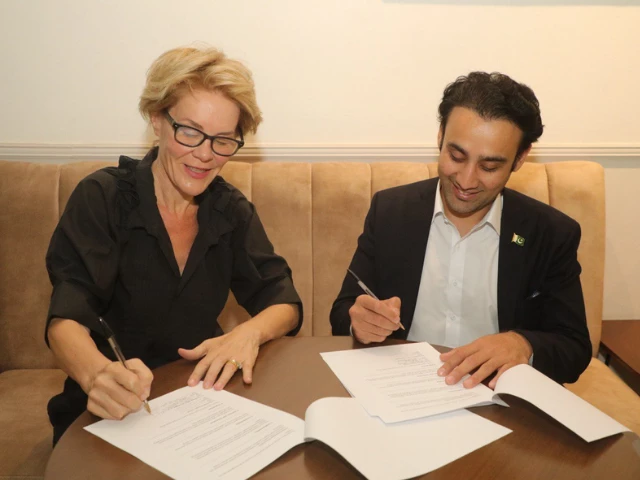Pakistan and El Salvador have agreed to establish formal cooperation on Bitcoin and blockchain initiatives, following a high-level meeting between Minister of State for Crypto and Blockchain Bilal Bin Saqib and Salvadoran President Nayib Bukele in San Salvador.
The engagement, described as the first official meeting between the Miinster of State and the Salvadoran head of state, culminated in the signing of a Letter of Intent (LoI) between the Bitcoin Office of El Salvador and the Pakistan Crypto Council.
The agreement aims to facilitate technical cooperation and knowledge exchange in key areas such as public sector applications of Bitcoin, blockchain-based financial inclusion, sovereign digital asset reserves, and regulatory innovation in emerging economies.
🇸🇻🤝🇵🇰
The Bitcoin Office signed a Letter of Intent with the Pakistan Crypto Council yesterday:
“The purpose of the LOI is to outline the mutual intention of the Parties to explore and establish a strategic collaboration in the fields of Bitcoin education, Bitcoin mining,… pic.twitter.com/gD90PTJ0Wi
— The Bitcoin Office (@bitcoinofficesv) July 17, 2025
According to a press release issued by the Ministry of Finance, the meeting centred exclusively on digital asset collaboration and was seen as a landmark in what officials termed “Biplomacy” — a blend of Bitcoin and diplomacy reflecting the growing role of decentralized technologies in international engagement.
“El Salvador’s bold Bitcoin experiment has inspired governments around the world,” said Bilal Bin Saqib, who also heads the Pakistan Crypto Council. “This visit marks the beginning of a strategic relationship rooted in innovation, inclusion, and shared learning.”
President Bukele welcomed Pakistan’s outreach, commending its forward-looking approach to digital assets and reaffirming El Salvador’s support for emerging economies exploring Bitcoin as a tool for financial sovereignty.
El Salvador, which made headlines in 2021 as the first country to adopt Bitcoin as legal tender, has become a focal point for nations assessing digital currencies to expand financial access and reduce reliance on traditional monetary systems.
Just met one of the most extraordinary visionary leaders of our time, President of El Salvador, @nayibbukele
A head of state who doesn’t just talk tech, but challenges it, from AI and robotics to Bitcoin.
He’s a leader from the future, who saw the future first because when it… pic.twitter.com/QpS6vVnTxv
— Bilal bin Saqib MBE (@Bilalbinsaqib) July 16, 2025
Pakistan is similarly working to establish a structured digital asset economy. Earlier this year, the government created the Pakistan Virtual Assets Regulatory Authority (PVARA) via presidential ordinance to regulate the crypto sector, curb illicit finance, and promote responsible innovation.
The State Bank of Pakistan also announced plans to complete a pilot project for a central bank digital currency (CBDC) within the current fiscal year.
Officials believe the Pakistan–El Salvador agreement will help advance policy dialogue on sovereign digital asset frameworks, encourage public-private collaboration, and position Pakistan as a serious participant in global crypto governance.
Financial analysts estimate that ongoing reforms, including the integration of virtual assets into the formal economy, could bring up to $25 billion into the country’s tax net.
